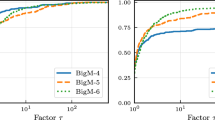Abstract
Multilevel programming is developed to solve the decentralized problem in which decision makers (DMs) are often arranged within a hierarchical administrative structure. The linear bilevel programming (BLP) problem, i.e., a special case of multilevel programming problems with a two level structure, is a set of nested linear optimization problems over polyhedral set of constraints. Two DMs are located at the different hierarchical levels, both controlling one set of decision variables independently, with different and perhaps conflicting objective functions. One of the interesting features of the linear BLP problem is that its solution may not be Paretooptimal. There may exist a feasible solution where one or both levels may increase their objective values without decreasing the objective value of any level. The result from such a system may be economically inadmissible. If the decision makers of the two levels are willing to find an efficient compromise solution, we propose a solution procedure which can generate effcient solutions, without finding the optimal solution in advance. When the near-optimal solution of the BLP problem is used as the reference point for finding the efficient solution, the result can be easily found during the decision process.
Similar content being viewed by others
References
Bard, J. F. (1982), Optimality Conditions for the Bi-Level Programming Problem, Naval Research Logistics Quarterly 31, 13–26.
Bard, J. F. (1981), Technical Note: Some Properties of the Bi-Level Programming Problem, Journal of Optimization Theory and Applications 68, 371–378.
Ben-Ayed, O., Boyce, D. E. and Blair, C. E. (1988), A General Bilevel Linear Programming Formulation of the Network Design Problem, Transportation Research 22B, 311–318.
Bialas, W. F. and Karwan, M. H. (1982), On Two-Level Optimization, IEEE Transactions on Automatic Control 27, 211–214.
Bialas, W. F. and Karwan, M. H. (1984), Two-Level Linear Programming, Management Science 30, 1004–1020.
Candler, W. and Townsly, R. (1982), A Linear Two-Level Programming Problem, Computers and Operations Research 9, 59–76.
Fortuny-Amat, J. and McCarl, B. (1981), A Representation and Economic Interpretation of A Two-level Programming Problem, Journal of Operational Research Society 32, 783–792.
Jones, A. J. (1980), Game Theory: Mathematical models of conflict, Ellis Horwood Limited, Chichester, West Sussex, England.
Keeney, R. L. and Raiffa, H. (1976), Decision with Multiple Objectives: Preferences and Value Trade-Offs, John Wiely & Sons, New York.
Steuer, R. E. (1986), Multiple Criteria Optimization: Theory, Computation, and Application, John Wiley & Sons, New York.
Wen, U. P. and Hsu, S. T. (1991), Linear Bi-Level Programming Problems—A Review, Operational Research Society 42, 125–133.
Wen, U. P. and Hsu, S. T. (1989), A Note on A Linear Bi-Level Programming Algorithm Based on Bi-Criterion Programming, Computer and Operations Research 16, 79–83.
Wen, U. P. and Hsu, S. T. (1992), Efficient Solutions for the Linear Bi-Level Programming Problem, European Journal of Operational Research 62, 354–362.
Yu, P. L. (1986), Multiple Criteria Decision Making: Concepts, Techniques and Extensions, Plenum, New York.
Zeleny, M. (1982), Multiple Criteria Decision Making, McGraw-Hill, New York.
Author information
Authors and Affiliations
Rights and permissions
About this article
Cite this article
Wen, UP., Lin, SF. Finding an efficient solution to linear bilevel programming problem: An effective approach. J Glob Optim 8, 295–306 (1996). https://doi.org/10.1007/BF00121271
Received:
Issue Date:
DOI: https://doi.org/10.1007/BF00121271




